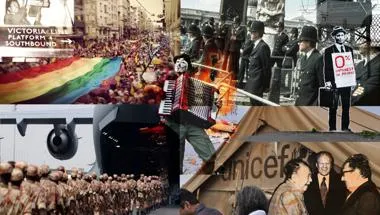
Dr Frank Foley
Senior Lecturer in International Relations
Research interests
- Conflict
- Human Rights
- International relations
- Security
Biography
Dr Frank Foley is a Senior Lecturer in International Relations at the Department of War Studies. His research lies at the intersection of comparative politics and international relations, with a focus on counterterrorism, human rights, intelligence and security policy.
Prior to this post, he held post-doctoral fellowships at Stanford University’s Center for International Security and Co-operation (CISAC); at the Department of War Studies; and at the Centre for Political and Constitutional Studies in Madrid. In 2010 he received a “Terrorism Research Award” from the US National Consortium for the Study of Terrorism and Responses to Terrorism (START).
He holds a PhD in Political Science (2008) from the European University Institute in Florence and an MPhil in the History of Political Thought from the University of Cambridge. He conducted research on the Northern Ireland conflict at the University of Ulster during 2004 and worked as a journalist in Brussels between 2001 and 2003.
Research interests:
Counterterrorism: He is interested in why states respond to terrorism as they do, and the consequences of counterterrorist policy for the state, for individual citizens and for militant networks. His first book – Countering Terrorism in Britain and France: Institutions, Norms and the Shadow of the Past (Cambridge University Press, 2013) – is a comparative analysis of British and French counterterrorist policies, legislation and operations. Drawing on institutional and constructivist theories, it argues that western states’ different institutions and norms in the field of security are shaping their responses to Islamist terrorism, leading to divergent approaches to a common problem. The book has been reviewed in European Political Science as part of a review exchange with Professor Stuart Croft; it has also been reviewed in the Spectator, Perspectives on Politics, Political Studies Review and Terrorism and Political Violence
Human Rights: Dr Foley is currently working on a comparative research project on how torture becomes socially sustainable in contemporary societies. The analysis focuses in particular on the conditions under which “shaming” and other forms of contestation can delegitimise torture and conversely the conditions under which torture may be legitimised and solidified. Initial findings of the project can be found in his article, “The (de)legitimation of torture,” published in the European Journal of International Relations (2021). This is being expanded into a book project, provisionally entitled Torture and the Politics of Shame, comprising a comparative analysis of torture in the US ‘Global War on Terror’, the UK’s campaign against jihadist violence, the UK’s conflict with the Irish Republican Army, and Spain’s fight against Basque militancy.
Intelligence and Law Enforcement: This research focuses on the respective roles of intelligence and law enforcement agencies in counterterrorism and the relationship between them on national security investigations. It includes a project that analyses the co-ordination of counterterrorist police and intelligence agencies within the United States, Britain and France, drawing on organisation theory to explain why some countries achieve higher levels of inter-agency co-operation than others. Key findings of this project can be found in this Washington Post piece and this journal article.
Teaching:
He convenes two modules:
- 4SSW1008 Conflict and Diplomacy (BA in IR) ·
- 7SSWM082 Political Violence, Counterterrorism and Human Rights (MA)
Expertise and public engagement:
He writes opinion pieces and comments for a variety of media, including Open Global Rights, the Washington Post, the Economist, the Guardian, the Independent, BBC News, BBC Radio 4, Newsweek, France 24, Voice of America, Radio France Internationale and the Sun. His book has also been covered in the Telegraph and the Spectator online.
He has briefed governments and security practitioners on his research findings, including the UK Home Office, the UK Foreign Office, British and French counterterrorist officials, and Department of Defense staff at the Pentagon in Washington DC.
Publications:
Book:
- Countering Terrorism in Britain and France: Institutions, Norms and the Shadow of the Past (Cambridge University Press, 2013).
Journal articles:
- ‘The (de)legitimation of torture: rhetoric, shaming and narrative contestation in two British cases,’ European Journal of International Relations, Vol. 27, Issue 1 (2021), 102–126.
- ‘Why Inter-Agency Operations Break Down: U.S. Counterterrorism in Comparative Perspective,’ European Journal of International Security, Vol. 1, No. 2 (2016), 150-175.
- ‘Terrorismo y represión estatal: estrategia y normas en Francia y el Reino Unido,’ Afers Internacionals, No. 112 (April 2016).
- ‘Constraining Britain’s Legal Responses to Terrorism: Norm Competition and the Prospects for Liberal Democracy,’ European Journal of Criminal Research and Policy, Vol. 18, No. 4 (2012).
- ‘Reforming Counterterrorism: Institutions and Organizational Routines in Britain and France,’ Security Studies, Vol. 18, No. 3 (2009), 435-78.
- ‘The Expansion of Intelligence Agency Mandates: British Counterterrorism in Comparative Perspective,’ Review of International Studies, Vol. 35, No. 4 (2009), 983-95.
- ‘North-South relations and the outbreak of the Troubles in Northern Ireland, 1968-69: the response of the Irish Press,’ Irish Studies in International Affairs, Vol. 14 (2004): 9-31.
Book chapters:
- ‘Counterterrorism and Human Rights,’ in Contemporary Terrorism Studies, eds., Diego Muro and Tim Wilson (Oxford: Oxford University Press, 2022). Also available at edu.
- ‘Terrorism and State Repression: Strategic Choice and the Domestic Normative Context,’ in When Does Terrorism Work? ed., Diego Muro (London and New York: Routledge, 2018).
- ‘France,’ in Andrew Silke, ed. The Routledge Handbook of Terrorism and Counter-terrorism, (London and New York: Routledge, 2018). ·
- ‘Counterterrorism and Intelligence,’ in The Encyclopedia of US Intelligence, ed., Gregory Moore (New York: Taylor and Francis, 2014).
- With Max Abrahms, ‘Terrorism and Counterterrorism,’ in The International Studies Encyclopedia, eds., Robert Denemark et al. (Oxford: Wiley-Blackwell, 2010).
Please see Academia.edu for downloadable articles, and his entry in the Research Portal for further publications.
Research

Research Centre in International Relations (RCIR)
The Research Centre in International Relations conducts research on practices of security and conflict, their transformation, and their social and political implications.
Research

Research Centre in International Relations (RCIR)
The Research Centre in International Relations conducts research on practices of security and conflict, their transformation, and their social and political implications.
